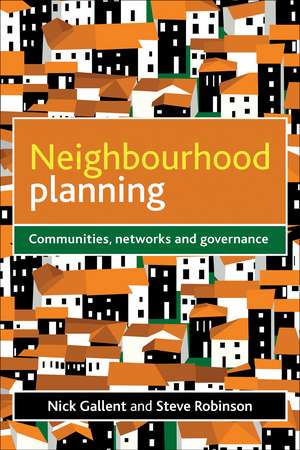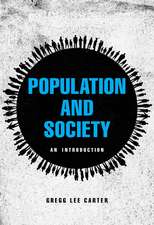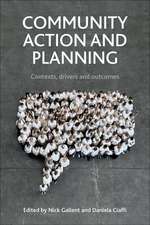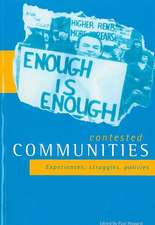Neighbourhood Planning: Communities, Networks and Governance
Autor Nick Gallent, Steve Robinsonen Limba Engleză Paperback – 14 mai 2013
Neighbourhood Planning offers a critical analysis of community-based planning in England. A lively examination of planning practices, it sketches the value, rationale, and limits of collaboration within this endeavor, arguing that planning power should shift from the public realm to local communities. The authors question the extent to which movement toward genuine local partnerships— and the consensus required for them—can be achieved through rescaling, as opposed to greater efforts spent building relationships and generating trust in the communities affected. In doing so, they highlight the potential contribution such planning practices can make to the development of a collaborative democracy.
| Toate formatele și edițiile | Preț | Express |
|---|---|---|
| Paperback (1) | 391.83 lei 43-57 zile | |
| Bristol University Press – 14 mai 2013 | 391.83 lei 43-57 zile | |
| Hardback (1) | 829.71 lei 43-57 zile | |
| Bristol University Press – 29 mai 2012 | 829.71 lei 43-57 zile |
Preț: 391.83 lei
Nou
Puncte Express: 588
Preț estimativ în valută:
74.98€ • 78.48$ • 62.40£
74.98€ • 78.48$ • 62.40£
Carte tipărită la comandă
Livrare economică 31 martie-14 aprilie
Preluare comenzi: 021 569.72.76
Specificații
ISBN-13: 9781447300076
ISBN-10: 1447300076
Pagini: 224
Ilustrații: 7 halftones, 5 figures, 1 table
Dimensiuni: 152 x 229 x 15 mm
Greutate: 0.36 kg
Editura: Bristol University Press
Colecția Policy Press
ISBN-10: 1447300076
Pagini: 224
Ilustrații: 7 halftones, 5 figures, 1 table
Dimensiuni: 152 x 229 x 15 mm
Greutate: 0.36 kg
Editura: Bristol University Press
Colecția Policy Press
Notă biografică
Nick Gallent is professor of housing and planning and head of the Bartlett School of Planning at University College London and coauthor of Rural Second Homes in Europe and Delivering New Homes. Steve Robinson is senior planning officer at Allerdale District Council.
Cuprins
List of figures, images and table
Abbreviations
Acknowledgements
Authors' note
Part One: Democracy, planning and localism
1. Introduction
2. Democratic renewal, planning and housing growth in England
3. Localism and its antecedents
4. Community-based planning and plans
Part Two: Capacity building and community-based planning
5. Ashford and its strategic planning context
6. Power, capacity and collaborative planning
7. Community dynamics and planning
8. Capacity building and outreach
Part Three: The interface with policy actors
9. Connectivity at the policy-community interface
10. Working with local government
11. Working through intermediaries
12. Community-based plans
13. Planning's critical interface
Part Four: Neighbourhood planning, leadership and democratic renewal
14. Responsibility and responsiveness: lessons from parish planning
15. Conclusions
References
Index
Abbreviations
Acknowledgements
Authors' note
Part One: Democracy, planning and localism
1. Introduction
2. Democratic renewal, planning and housing growth in England
3. Localism and its antecedents
4. Community-based planning and plans
Part Two: Capacity building and community-based planning
5. Ashford and its strategic planning context
6. Power, capacity and collaborative planning
7. Community dynamics and planning
8. Capacity building and outreach
Part Three: The interface with policy actors
9. Connectivity at the policy-community interface
10. Working with local government
11. Working through intermediaries
12. Community-based plans
13. Planning's critical interface
Part Four: Neighbourhood planning, leadership and democratic renewal
14. Responsibility and responsiveness: lessons from parish planning
15. Conclusions
References
Index
Recenzii
“This is a major advance in the development of collaborative planning that combines erudite scholarship with a pragmatic appraisal of the role communities can play in helping to shape their own localities.”
"This book should be required reading for all those in central and local government who have an interest in promoting local democracy and ensuring that local communities are fully engaged in a more devolved planning system."
"The Government has shaken up the planning system and wants to hand more power to local people through new 'Neighbourhood Plans'. Providing a critical analysis of community-based planning in England, Professor Gallent's book's could not be timelier."
"This book challenges the rhetoric and megaphone debate that surrounds localism. It is essential reading for anyone who wants a critical understanding of the background and issues posed by the new planning system."





















